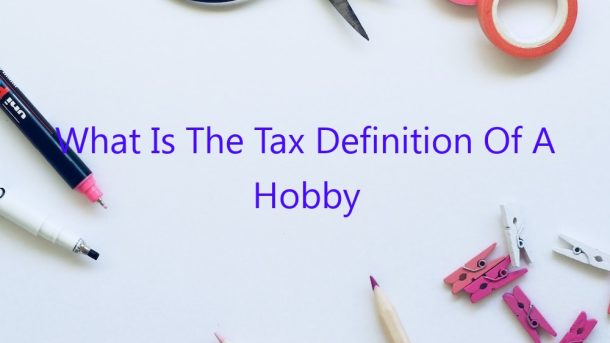What is the tax definition of a hobby?
A hobby is a activity engaged in for pleasure and not for profit. Tax purposes, a hobby is an activity not engaged in as a trade or business. The profits from a hobby are taxable, but the deductions that can be taken are limited.
How is a hobby different from a business?
A business is an activity engaged in to make a profit. The profits from a business are taxable. A business can deduct expenses that are related to the business.
What determines if an activity is a hobby or a business?
The Internal Revenue Service looks at a number of factors to determine if an activity is a hobby or a business. Some of the factors include whether the activity is engaged in regularly, the purpose of the activity, the time and effort put into the activity, and whether the activity is carried on in a businesslike manner.
Contents
What qualifies as a hobby for tax purposes?
What qualifies as a hobby for tax purposes?
There is no specific definition of what qualifies as a hobby for tax purposes. In general, the IRS looks at whether an activity is engaged in for profit or pleasure. If an activity is pursued primarily for pleasure and not for profit, it is more likely to be considered a hobby.
There are a few factors the IRS considers when determining whether an activity is a hobby or a business:
-The time and effort spent on the activity
-The intention of the taxpayer when starting the activity
-The amount of money earned or lost from the activity
-The amount of time the activity is pursued
If an activity is considered a hobby, the taxpayer may not be able to deduct any expenses related to the activity. However, if the activity is considered a business, the taxpayer may be able to deduct expenses such as equipment, supplies, and travel.
It is important to consult with a tax professional to determine whether an activity qualifies as a hobby or a business.
How much can you make as a hobby before paying tax?
No one can say for certain how much money you can make as a hobby before you have to start paying taxes on it. This is because your specific tax situation may be different from someone else’s, and the laws governing taxes are always changing. However, there are a few things you can do to get a better idea of how much you might need to pay.
To start with, you should understand the difference between hobby income and business income. Hobby income is money that you make from activities you do for fun, while business income is money you make from activities you do in order to make a profit. The IRS usually taxes business income differently than hobby income, and you may be able to deduct some expenses associated with your business.
However, if you’re making a lot of money from your hobby, the IRS may decide that you’re actually running a business, and you’ll then be taxed as if you were. In this case, you’ll need to keep track of all of your expenses and income, and may not be able to deduct as many of them.
So how much can you make before you have to start paying taxes? There’s no easy answer to that question, but it’s a good idea to talk to a tax professional to get a better idea of your specific situation.
What does the IRS identify as the difference between a business and a hobby?
There is no definitive answer to this question as the distinction between a business and a hobby can be somewhat subjective. However, the IRS typically looks at a number of factors in order to determine whether an activity is a business or a hobby.
Some of the key factors that the IRS considers include the following:
-The taxpayer’s intention in engaging in the activity.
-The amount of time and effort the taxpayer puts into the activity.
-The taxpayer’s financial results from the activity.
-Whether the taxpayer conducts the activity in a business-like manner.
Generally, if the taxpayer is making a profit from the activity, it is more likely that the IRS will treat it as a business. Conversely, if the taxpayer is losing money from the activity, the IRS is more likely to treat it as a hobby.
Can I earn money from a hobby without paying tax?
When it comes to earning a little extra money on the side, many people turn to their hobbies. After all, what could be better than getting paid to do something you love?
But is it possible to earn money from a hobby without paying tax? The answer is a bit complicated, but in short: it depends on how you make the money.
Generally, if you earn income from your hobby, you will need to pay tax on that money. However, there are a few exceptions. For example, if you make a small amount of money from your hobby, you may not need to pay tax on it.
Additionally, if you use your hobby to generate income but also incur expenses related to that hobby, you may be able to deduct those expenses from your taxable income. This can help reduce the amount of tax you owe on your hobby income.
So, if you’re looking to make a little bit of money from your hobby, it’s important to understand how the tax system works. By taking into account the relevant rules and regulations, you can ensure that you stay on the right side of the law – and keep more of your hard-earned cash in your pocket.
Can you deduct hobby expenses in 2021?
Income taxes can be a confusing topic, even for tax professionals. Deducting your hobby expenses is one of the areas that can be particularly confusing for taxpayers. In general, you can deduct hobby expenses if the activity is not engaged in for profit. This means that you cannot have any expectation of making a profit from the activity.
There are a few things to consider when determining whether you can deduct your hobby expenses. The first is whether the activity is a hobby or a business. If the activity is a business, you can deduct your expenses as a business expense. However, if the activity is a hobby, you can only deduct your expenses if you itemize your deductions.
In addition, there are some specific expenses that you can only deduct if the activity is a business. These expenses include advertising, supplies, and depreciation on equipment used for the activity. If the activity is a hobby, you can only deduct the amount of expenses that exceed the income earned from the activity.
For example, if you earn $1,000 from your hobby, you can only deduct the amount of expenses that exceed $1,000. This means that you can only deduct the amount of expenses that exceed your income from the activity.
If you have any questions about whether you can deduct your hobby expenses, please consult a tax professional.
How can hobby loss rules be avoided?
The hobby loss rules can be easily avoided by following a few simple steps. First, it is important to understand what the rules are and how they can impact your taxes. The rules state that if you have a hobby that loses money, you cannot deduct those losses from your other income. This can be a major disadvantage if you are trying to reduce your taxable income.
There are a few ways to avoid this, however. One is to make sure your hobby is considered a business. This can be done by keeping good records of your income and expenses, and by treating your hobby like a business in all respects. Another way to avoid the hobby loss rules is to make sure your hobby does not lose money. This can be more difficult to do, but it is possible by making sure your expenses are less than your income.
Overall, the best way to avoid the hobby loss rules is to make sure your hobby is a business. This can be done by keeping good records and treating your hobby like a business. If you follow these tips, you can avoid having your hobby losses impact your taxes.”
Is selling crafts considered income?
Is selling crafts considered income? This is a question that many crafters may ask themselves at some point. The answer is not always straightforward, as it depends on the specifics of each situation.
In general, the sale of crafts can be considered income for tax purposes. This means that you may be required to report the income and pay taxes on it. However, there are some exceptions. If you are selling crafts as a hobby, you may not need to report the income.
There are a few things to consider when determining whether selling crafts constitutes income. The most important factor is whether you are making a profit. If you are selling crafts at a loss, then the income from those sales would not be taxable. However, if you are making a profit, then the income from those sales would be taxable.
In addition, the amount of time you spend on your craft business and the amount of money you spend on supplies and materials are also important factors. If you are spending a lot of time and money on your craft business, then the income from those sales is more likely to be considered taxable.
Overall, the sale of crafts can be considered income for tax purposes, but there are a few things to consider. If you are selling crafts as a hobby, you may not need to report the income. If you are making a profit, then the income from those sales is more likely to be considered taxable.




